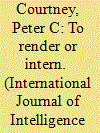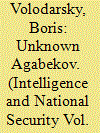| Srl | Item |
| 1 |
ID:
067233


|
|
|
| 2 |
ID:
141445


|
|
|
|
|
| Summary/Abstract |
The so-called Schengen compensatory measures such as the Schengen Information System (SIS) or the European Dactylographic System (Eurodac) have been the centre of much attention. However, the research on these security measures has focused almost solely on their effect on liberty, human rights, and the like. Not much attention has been given to the actual effectiveness of the security remedies taken in the European Union (EU) to compensate for the abolition of border controls, despite effectiveness being an obvious source of legitimacy in the realm of security. This article takes a first step in the direction of correcting this neglect and develops the foundations for an analytical framework focusing on effectiveness and legitimacy. The framework is illustrated through a minor analysis of the legal and institutional set-up of SIS and Eurodac as examples pointing to sources of ineffectiveness in the very set-up of the databases.
|
|
|
|
|
|
|
|
|
|
|
|
|
|
|
|
| 3 |
ID:
059622


|
|
|
|
|
| Publication |
London, William Heinemann Ltd., 1985.
|
| Description |
xviii, 619p.hbk
|
| Standard Number |
0434021105
|
|
|
|
|
|
|
|
|
|
|
|
Copies: C:1/I:0,R:0,Q:0
Circulation
| Accession# | Call# | Current Location | Status | Policy | Location |
| 031054 | 327.120941/AND 031054 | Main | On Shelf | General | |
|
|
|
|
| 4 |
ID:
122913


|
|
|
|
|
| Publication |
2013.
|
| Summary/Abstract |
On 28 May 2009, the Los Angeles Times reported that the United States Department of Justice and the Federal Bureau of Investigation (FBI) planned to significantly expand their role in global counterterrorism operations, as part of a policy shift that would replace the Central Intelligence Agency (CIA)-dominated system of clandestine detentions and interrogations with one built around transparent investigations and prosecutions. This new "global justice" initiative has created a more central role for FBI agents in overseas counterterrorism cases, and harkens back to the FBI's Special Intelligence Service (SIS). In 1940, President Franklin D. Roosevelt had requested the creation of the SIS that served as the Bureau's foreign intelligence and counter-subversive wing in Latin and South America until its disbandment in 1947.
|
|
|
|
|
|
|
|
|
|
|
|
|
|
|
|
| 5 |
ID:
059573


|
|
|
| 6 |
ID:
124575


|
|
|
|
|
| Publication |
2013.
|
| Summary/Abstract |
The decision to declassify selected historical documents from the archives of the Security Service in 1997 has been a boon to academic historians of intelligence. The declassified files reveal the successes and failures of the Security Service in fulfilling its statutory function of defending the realm. Yet the activity of Soviet spies continues to be one of the most challenging topics in intelligence history. The role of Soviet defectors in transforming the Security Service's understanding of the nature and extent of Soviet intelligence operations, meanwhile, remains largely understudied. In the case of Agabekov, for example, the reaction of SIS or MI5 to his 'disappearance' in the spring of 1938 has long been neglected. It is possible that there was no reaction at all, because both services had long-since written off Agabekov as a source. This helps explain why Agabekov's case has been ignored in the relevant literature in both Russia and the West.
|
|
|
|
|
|
|
|
|
|
|
|
|
|
|
|